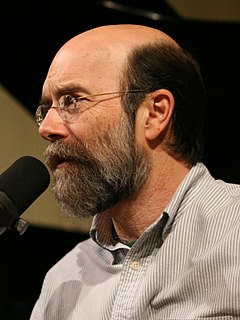A Quote by Myrtle Reed
It is personal vanity of the most flagrant type which intrudes itself, unasked, into other people's affairs. There are few of us who do not feel capable of ordering the daily lives of others, down to the most minute detail.
Related Quotes
Most people coming out of war feel lost and resentful. What had been a minute-to-minute confrontation with yourself, your struggle with what courage you have against discomfort, at the least, and death at the other end, ties you to the people you have known in the war and makes for a time others seem alien and frivolous.
And if I remain in the dark about our purpose here, and the meaning of eternity, I have nevertheless arrived at an understanding of a few more modest truths: Most of us fear death. Most of us yearn to comprehend how we got here, and why-- which is to say, most of us ache to know the love of our creator. And we will no doubt feel that ache, most of us, for as long as we happen to be alive.
The fact is that the beautiful, humanly speaking, is merely form considered in its simplest aspect, in its most perfect symmetry, in its most entire harmony with our make-up. Thus the ensemble that it offers us is always complete, but restricted like ourselves. What we call the ugly, on the contrary, is a detail of a great whole which eludes us, and which is in harmony, not with man but with all creation. That is why it constantly presents itself to us in new but incomplete aspects.
Most incredible, however, are the times we know Christ is with us in the midst of our daily, routine lives. In the middle of cleaning the house or driving somewhere in the pick-up, He stops us. . . in our tracks and makes His presence known. Often it's in the middle of the most mundane task that He lets us know He is there with us. We realize, then, that there can be no "ordinary" moments for people who live their lives with Jesus.
Most people dislike vanity in others, whatever share they have of it themselves; but I give it fair quarter, wherever I meet with it, being persuaded that it is often productive of good to the possessor, and to others who are within his sphere of action: and therefore, in many cases, it would not be altogether absurd if a man were to thank God for his vanity among the other comforts of life.
In the daily lives of most men and women, fear plays a greater part than hope: they are more filled with the thought of the possessions that others may take from them, than of the joy that they might create in their own lives and in the lives with which they come in contact. It is not so that life should be lived.
Religious people know deep down that that is the most vulnerable area of their lives, and when others question it, they are liable to hit out and feel insulted. You know it is absolutely without proof, yet people still commit themselves totally to this belief. They cannot refute it because it is so central to their lives.
Stories hold power because they convey the illusion that life has purpose and direction. Where God is absent from the lives of all but the most blessed, the writer, of all people, replaces that ordering principle. Stories make sense when so much around us is senseless, and perhaps what makes them most comforting is that, while life goes on and pain goes on, stories do us the favor of ending.
We cannot expect to be in control of the circumstances in our lives when we cannot control our minds for five minutes. Meditation is the daily minimum requirement that will prevent us from breaking down and falling apart at the most inopportune moments. It is the art of listening. It is a practice which enables us to tune in and fine-tune the key areas of our lives: the mind and the spirit.
In our daily lives we attend primarily to that which the senses are spelling out for us: to what the eyes perceive, to what the fingers touch. Reality to us is thinghood , consisting of substances that occupy space; even God is conceived by most of us as a thing. The result of our thinginess is our blindness to all reality that fails to identify itself as a thing, as a matter of fact.



































